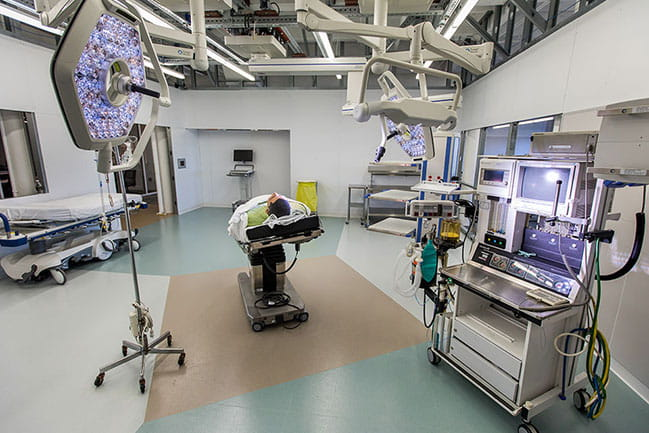The strategic imperative for effective management of hospitals in a declining economy like Nigeria is crucial to ensure that the health care sector in the country remains sustainable and continues to provide quality care to patients. Nigeria’s economic decline has led to a decrease in government funding for healthcare and an increase in healthcare costs, making it difficult for many people to access healthcare services.
Effective management of hospitals in this environment requires a multi-faceted approach that focuses on ensuring financial stability while improving the quality of care provided to patients. This can include implementing cost-saving measures, such as improving supply chain management, reducing waste and inefficiency, and optimizing the use of resources.
It is also important to focus on developing innovative solutions to improve patient outcomes, such as investing in technology and telemedicine to reach patients in remote areas and providing preventive care services to reduce the burden of chronic diseases.
In addition to improving financial stability and patient outcomes, effective management of hospitals is essential to attract and retain skilled healthcare professionals. This requires providing training and development opportunities for staff, creating a positive work environment, and ensuring that compensation and benefits are competitive.

Requirements for effective management of hospitals in Nigeria
Effective management of hospitals in Nigeria requires a multi-faceted approach that focuses on the following requirements:
- Leadership: Effective hospital management in Nigeria requires strong leadership at all levels, including the hospital administration, medical staff, and support staff. Leaders should have the necessary training and experience to lead their team and make informed decisions.
- Adequate Funding: Adequate funding is necessary to provide essential resources, modern equipment, and infrastructure needed for quality healthcare services in the hospital. Without adequate financing to provide these essential resources, hospitals may be unable to deliver appropriate care.
- Skilled Healthcare Staff: Hospitals should prioritize recruiting skilled healthcare professionals who are competent in their fields and committed to improving patient care. Continuous training, development, and performance appraisal can ensure that staff are equipped with the necessary skills to perform their jobs effectively.
- Effective Communication: Communication between hospital staff members, as well as between healthcare providers and patients, is crucial in managing hospitals effectively in Nigeria. Effective communication ensures coordinated care, increases patient satisfaction, and enhances overall hospital performance.
- Efficient Healthcare Delivery System: The hospital’s system should be efficient in terms of processes, procedures, and operations, ensuring timely delivery of healthcare services to patients.
- Quality Improvement: Quality improvement is an ongoing process that focuses on improving the quality-of-service delivery in hospitals. Quality improvement entails implementing evidence-based practices, regular audits, and continuous monitoring of effectiveness.
- Patient-Centered Care: Hospitals should prioritize the provision of patient-centered care. This approach ensures that patients receive personalized attention, their needs are met, and that they are treated with respect and empathy.

Skills for the effective management of hospitals
The skills required for effective hospital management include:
- Leadership skills: Effective hospital management requires strong leadership skills. Leaders should be able to motivate and inspire their team, develop strategies, and manage resources effectively.
- Communication skills: Effective communication skills are critical in managing hospitals. Hospital leaders should be able to communicate effectively with their team, patients, and other stakeholders to ensure provision of quality care.
- Financial management skills: Hospital management involves effective financial management, including budgeting, forecasting, and managing revenue and expenses. Hospital managers should have the skills to manage budgets effectively and prioritize spending to maximize resources.
- Project management skills: Hospitals operate on deadlines and schedules, requiring project management skills to manage multiple projects simultaneously effectively. Hospital managers should have the skills to plan, implement and execute projects.
- Quality assurance skills: Hospital management involves ensuring that quality patient care and safety standards are met. Hospital managers should be familiar with quality assurance practices and implementing quality improvement measures.
- Risk management skills: Effective hospital management requires managers to identify and mitigate any risks that could lead to negative outcomes, such as patient harm, financial loss, or legal issues.
- Human resource management skills: Hospitals need skilled healthcare professionals who can provide quality care to patients. Effective hospital management involves recruiting, training, and managing skilled healthcare professionals to meet patients’ needs.
- Information technology skills: Hospitals use complex technology systems to manage patient care data, medical records, billing, and other functions. Hospital managers should have knowledge and skills in using these tools effectively for maximum benefit.
In conclusion, effective hospital management in Nigeria requires strong leadership, adequate funding, skilled healthcare staff, effective communication, efficient healthcare delivery system, quality improvement, and patient-centered care. Implementing these requirements ensures that healthcare delivery in Nigeria is efficient, effective, affordable, and of high quality.
The skills for effective hospital management require concerted effort of government and the directors / owners of various healthcare institutions to train and develop hospital administrators, managers, medical doctors, nurses, pharmacists, lab scientists, radiographers and other healthcare practitioners in effective communication, financial management, project management, quality assurance, risk management, human resource management, and information technology skills.


1 Comment
Amazing stuff!! This article provides tangible insight into what effective hospital management looks like and also highlights the practical requirements and skills needed to grow a hospital business into a successful and globally recognized institution. I currently work in a hospital, and I would love to see some of these requirements be implemented there as well because I envision that integrating these principles spoken about in your article will take my hospital from where it is to where it could be. This is good work! Keep it up sir. Please I would love to see more articles like this. I wonder, do you train healthcare organizations as a whole or just the individual members?